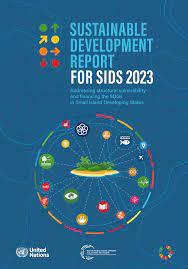
https://www.unsdsn.org/sdsn-releases-sustainable-development-report-for-...
It also introduces the Multidimensional Structural Vulnerability Index (MSVI) to assess the structural vulnerability of 180 countries worldwide, including 33 SIDS. The report investigates to what extent structural vulnerability impacts the ability of countries to achieve sustainable development, and identifies targeted financing mechanisms that can be used to respond to countries’ specific needs and vulnerabilities.
Key report messages include the following:
- Because of their inherent characteristics (e.g., smallness, remoteness, high exposure to natural hazards and climate change), SIDS are disproportionately exposed to structural (i.e. non-self-inflicted) vulnerabilities that hinder their development progress.
- The new SDG Index for SIDS shows that SIDS, whose average SDG Index score is 61.3, face greater gaps to SDG achievement than the rest of the world, whose average SDG Index score is 65.4. The SIDS in the Pacific region are the furthest behind in meeting the SDGs.
- Although over time SIDS have progressed on some SDGs, much remains to be done in several key areas for sustainable development, including enhancing statistical capacity.
- According to the Multidimensional Structural Vulnerability Index (MSVI) - a new tool to assess the structural vulnerability of 180 countries worldwide, including 33 SIDS - on average, SIDS are the most vulnerable countries in the world, and they face the highest levels of structural vulnerability across all three dimensions – economic, structural development and environmental. Pacific SIDS are the most vulnerable environmentally.
- Countries with high levels of vulnerability face greater obstacles in pursuing sustainable development compared to less vulnerable countries, and they also tend to experience high volatility in their GDP per capita growth, and therefore greater economic instability.
- SIDS face chronic underfinancing of sustainable development, and to achieve the SDGs they need significant external assistance. However, they struggle to access both concessional and private finance due to: (i) the use of the GNI per capita criterion to allocate concessional finance across countries; (ii) their lack of creditworthiness because of the current commercial credit rating methodologies considering exclusively short-term liquidity risks.
- To enhance their access to external financing, SIDS should: (i) demand the inclusion of a measure of vulnerability as a criterion (complementary to GNI per capita) to allocate concessional development finance; (ii) be strategic in using traditional and innovative financing mechanisms tailored to their country-specific vulnerabilities and needs; (iii) ask for the reform of the credit rating systems to recognize the long-term growth potential of developing and vulnerable countries; and (iv) overcome local barriers, such as limited statistical and institutional capacity, low degree of digitalization, weak governance and public expenditure management.









